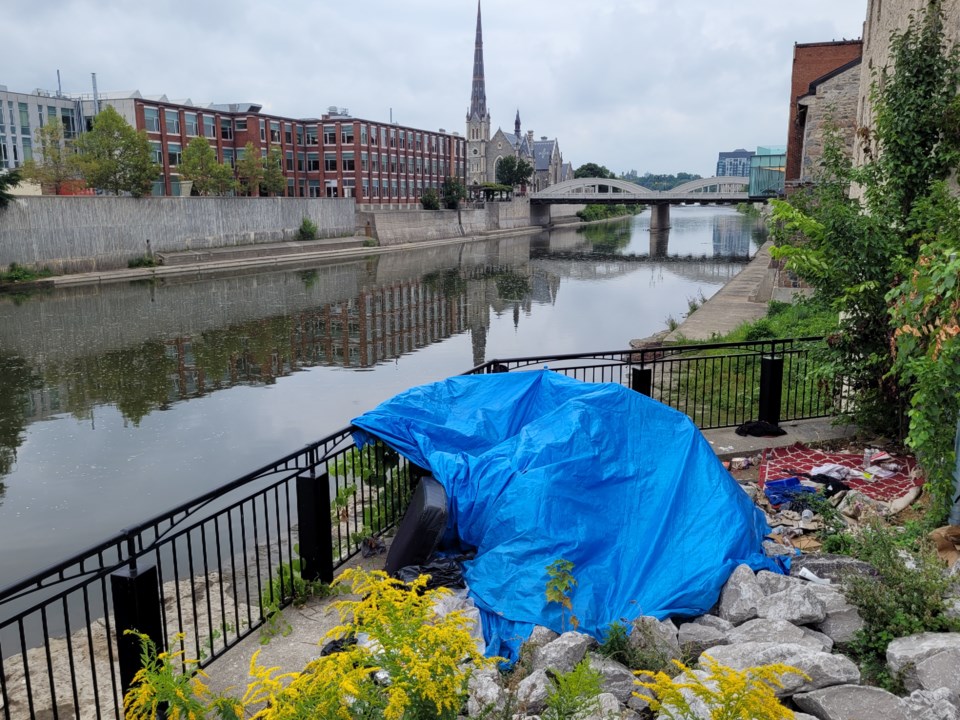Residents who have set up tents in an empty lot in downtown Cambridge will soon be evicted by the property owner, according to the councillor for the ward where the encampment is located.
It's a theme that seems to be common practice in Waterloo region; an encampment pops up, property owner evicts them, they move to another spot and repeat.
For the past few weeks, tents and makeshift shelters have been set up in an empty lot at 55 Kerr St. in Cambridge where ground will soon be broken for two 18-story condominium towers with a combined 445 units.
The camp is nestled just a few hundred meters away from 150 Main St., a regionally operated social service building that is home to the city's drop-in centre and will soon be home to a consumption and treatment services (CTS) site.
Jan Liggett is the councillor for Ward 4 and said the camp is committing several property standards by-law infractions.
“I have spoken twice to the owner of the property and they don't want the people on their lot,” she added.
According to Liggett, the police have received permission from the owner to evict anyone on the property when they get a complaint against trespassers. Evictions could be as early as today, she said.
But the camp was still in place late Thursday, something that angered Liggett, who said police were refusing to act on orders to remove trespassers.
"I am going to have to speak with the active police chief," she said, "The owners of the property have been calling them every day."
Cherri Greeno, communications director with Waterloo Regional Police Service, however, said their team won't be evicting anyone from the site and that police are typically called to encampments when there are concerns around public safety.
She said police will continue to work with the owner of the property while connecting residents of encampments to resources.
Since the Kerr Street encampment is on private property, it's a different situation to the Weber and Victoria encampment, and the Victoria Park encampment, in Kitchener, both of which are on public property. The region has gone to court in an effort to have tents removed from its property, but no evictions have happened yet.
Individuals who were occupying makeshift shelters on property owned by TC Energy, near Eagle Street and Industrial Drive in Cambridge, were removed from that site earlier this summer after the property owner asked the city, police and the region to take action. City bylaw officers issued notices to those individuals while outreach workers assisted in their relocation. Police were only involved to secure the area while it happened.
A resident who contacted CambridgeToday about the encampment on Kerr Street suggested the city is directing people experiencing homelessness to set up tents there rather than spread them out.
Liggett denies this claim and does not believe that anyone from the City of Cambridge would direct people to set up tents on private property.
She did however suggest local advocacy groups could have told those individuals that the lot near 150 Main St. is a suitable space.
Sanguen is an advocacy and support organization in Waterloo region and said, "we are not in a position to offer recommendations about encampment locations."
Lindsay Sprague, director of program development for Sanguen, thinks this issue will only get worse if there is not access to a more affordable, secure and safe housing environment.
These encampments act as a valuable tool for outreach workers to connect with those in need and offer more regular support, but this is not enough, added Sprague.
"There are not enough resources allocated to folks who are at most risk in our community, including those experiencing homelessness and complex mental health and health issues," she said. "As a community, we need to decide that this a priority and work with people who experience these issues to come up with real solutions."
The AIDS Committee Of Cambridge, Kitchener, Waterloo & Area (ACCKWA) is one of the regional partners working at 150 Main St. to provide social services to the city and has applied to oversee the CTS site at the building.
Ruth Cameron, director of ACCKWA, said they support all encampments in Cambridge, and local levels of government are working to solve this crisis.
“There are local government emergency plans for shelter and housing and medium term commitment for building new units, but implementation will take some time,” said Cameron.
The options for these people being shuffled around from encampment to encampment like a deck of cards is running out as the colder months approach.
There are only so many beds in the city and most of them are taken. The region is aiming to build 2,500 new affordable housing units over the next five years, but getting on a wait list and securing a place can take months, if not years.
More immediate solutions are being discussed by the region, said Sprauge, but there just isn't enough support for everyone.


